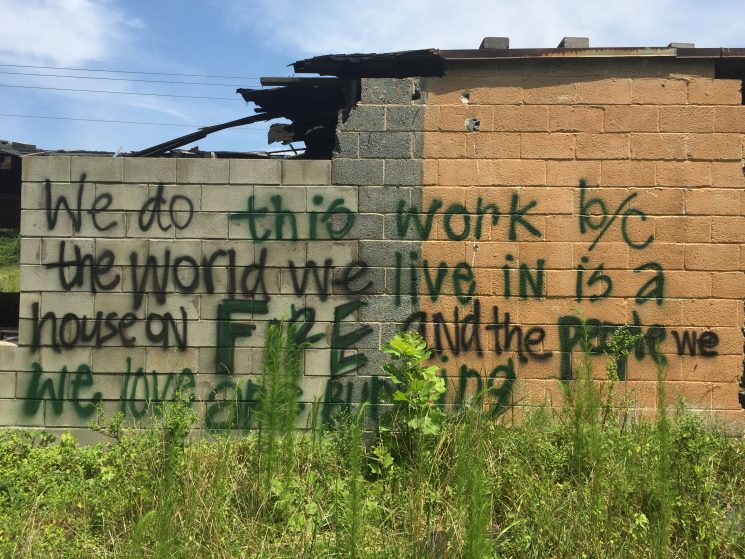Article & Photos by Kassi Dephinia
Last year, Alternate ROOTS’ ArtAbility scholarship enabled me, a disabled artist, to attend ROOTS week. Being immersed in that environment of activism and artistry changed my life. I left determined to start speaking out in creative ways about my experiences with oppression.
Novels, movies, television, music, and writing my own stories helped me survive extreme abuse growing up. The arts sustained me through discovering I had no friends or family I could depend on or trust, through the loss of my husband, my beloved service dog, faith, illusions, most of my material possessions, savings, and home. Art, especially story, is what gives my life shape and meaning, and sometimes the will to hang on one more day against overwhelming odds.
Invisible Disabilities
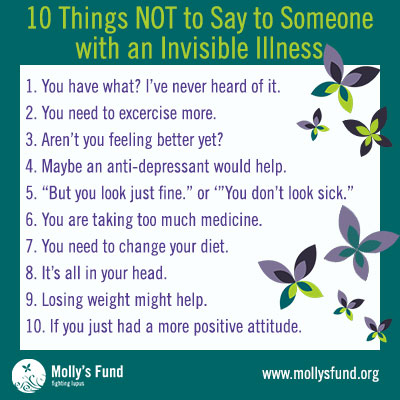 Discussions of disability and arts access tend to focus on dramatic and visible disabilities related to mobility, vision, hearing, and cognitive development. We have dance companies for the mobility impaired, art studios for the developmentally disabled. However, these programs only serve people with those disabilities.
Discussions of disability and arts access tend to focus on dramatic and visible disabilities related to mobility, vision, hearing, and cognitive development. We have dance companies for the mobility impaired, art studios for the developmentally disabled. However, these programs only serve people with those disabilities.
Disability and access needs are much bigger than we imagine. There’s a dominant cultural picture of disability in the form of ‘inspiration porn’ – such as legless men and women in wheelchairs insisting that anything can be overcome. This sets expectations unjustly high for all people with disabilities. I recently read a call for disabled artists to volunteer unpaid time and work to share how they overcame their limitations, to “demonstrate how people with very special needs have excelled in spite of many challenges.” It felt profoundly unfair and exploitive to me. When we only see those who manage through enormous effort to overcome their disabilities, we reinforce an ableist narrative that not only refuses to see those who can’t, but places the burden on them to become effectively less disabled in order to be worthy of visibility. We can’t dismantle oppression if we only look at successes.
Also, 75% of Americans living with disability don’t use wheelchairs or any kind of assistive mobility equipment. Though the universal symbol for disability is a wheelchair, most disabilities are invisible. Mine are. I’ve been fighting to get Social Security Disability Income for two years, living invisibly homeless in an abandoned RV and selling off almost all I own to survive.
The reality is, even though most disabilities are invisible, people judge whether or not someone’s disability is valid. Based on what they see and have picked up from culture and what they personally believe, rather than on intimate knowledge with the person or their specific experiences.
‘Passing’ as abled has often helped me cut down on (but not eliminate) the amount of discrimination and violence I experience. It also often hinders respect and recognition of my reality. Because I can do many things visibly disabled people can’t, often people believe that I’m not disabled.
Even when I’m believed, a common response to my disclosure of disability is unsolicited advice. Unsolicited advice is criticism. Since I lack visible impediments, many interpret my painful symptoms as ‘perceptual’ problems – even some doctors and therapists. I’m the one who lives with the results if I don’t take my disability seriously, and insist that those around me do as well.
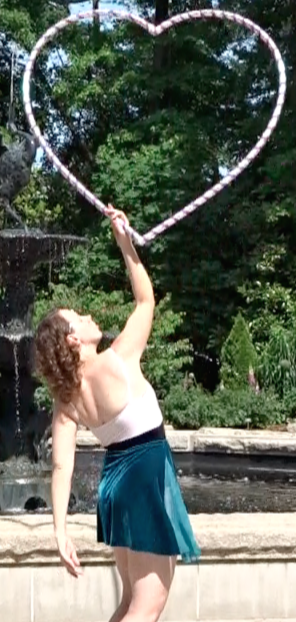 Like unsolicited advice, nonconsensual ‘help’ is a common socialized response to my struggles that can make things worse for me. I can’t tell you how many well-meaning but overbearing and ill-informed people have ‘helped’ without consent or forewarning, in ways that hurt me, humiliated me, or placed expectations on me I couldn’t meet. Consent is crucial when doing something that impacts another person’s life. My litmus test is: if you can’t ask permission and graciously take ‘no’ for an answer, it’s not about them, it’s about you.
Like unsolicited advice, nonconsensual ‘help’ is a common socialized response to my struggles that can make things worse for me. I can’t tell you how many well-meaning but overbearing and ill-informed people have ‘helped’ without consent or forewarning, in ways that hurt me, humiliated me, or placed expectations on me I couldn’t meet. Consent is crucial when doing something that impacts another person’s life. My litmus test is: if you can’t ask permission and graciously take ‘no’ for an answer, it’s not about them, it’s about you.
It’s also important to note that nearly one in three people with disabilities live in poverty like me. Disability can be both a cause and consequence of poverty. Living poor is hard work even for the abled. It makes everything about disability harder as well, particularly health care. I need a service dog and I can’t afford one. I struggle to take care of myself and fight to get my basic needs met.
Art Illuminates Truth and Life
As essential as art has been to my survival and quality of life, sometimes I don’t have enough resources to take care of me and make or enjoy art. From day to day I don’t know what I will be able to do, how much my symptoms will impact and limit me. Because my symptoms are so unpredictable, I find it freeing to work in different disciplines. Things like dance, photography, and found object sculpture offer different ways of articulating when words fail me. Writing can be there for me when I’m bed-bound. I’m learning the ukulele, but music, humor, and imagination are the hardest things for me to create while living in this ongoing trauma of homelessness.
Whether spoken-word or poetry, photography or sculpture, blog posts or clumsy songs, my art reflects uncomfortable realities and experiences people would rather deny. Alternate ROOTS showed me I didn’t have to filter that out. I learned that my frustration and my story could serve a purpose at the core of my art.
Even as a kid I knew it’s easier to tell the truth in fiction. As an adult I know it’s also often easier to hear, see, feel the truth through the arts. Truth is more than just facts. The feelings that the arts can express have long been part of social change, including one of my favorites, the Singing Revolution.
Speaking out about my disability and poverty, I’m encountering the socialized systemic discrimination, silencing, and mistreatment that remind me why I struggled for so long to ‘pass’ as middle-class and able-bodied. But I’m inspired and uplifted by artists both from ROOTS Week and in my explorations since.
In a recent online discussion of disability and arts access, I wrote about how much online resources have helped me both as a disabled person and an artist, and my desire for forums to continue conversations and share resources among disabled artists and program administrators around the world. Sometimes the hardest thing is reaching oppressed people with information that can help us.
Arts opportunities and resources on the internet are essential to me. I can use what energy and time I have when I have it with online platforms, tutorials, forums, and video conferencing. Online activism is powerful and necessary for those whose disabilities and financial constraints often limit our participation.
“What do you need?”
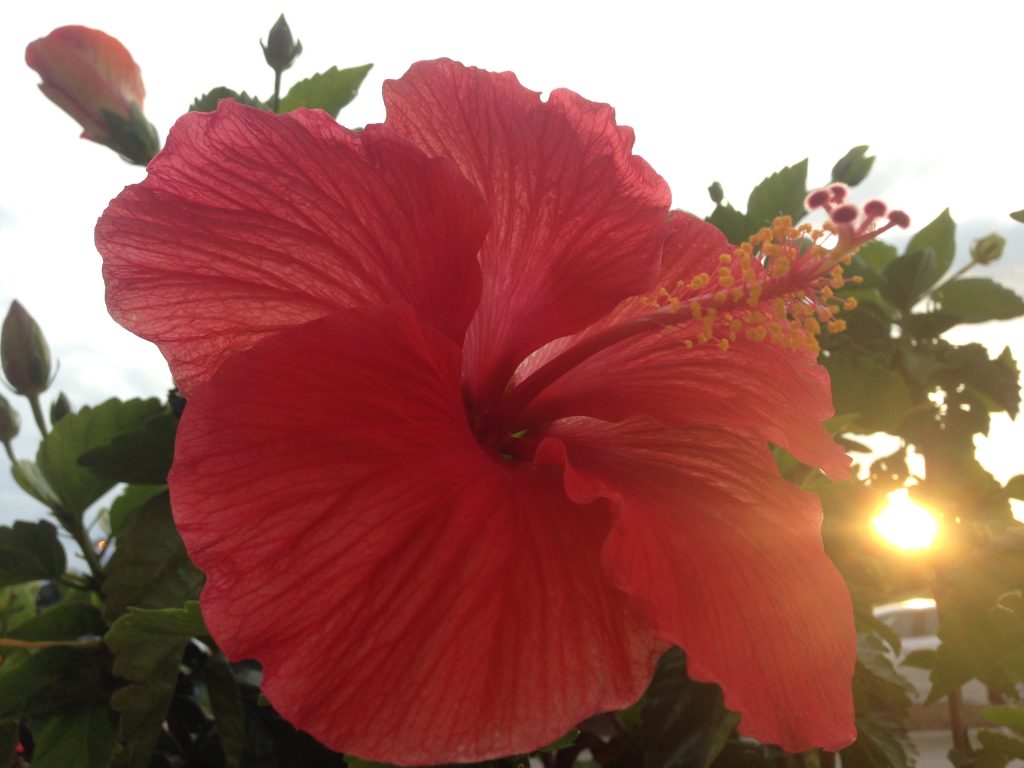 I feel most alive, my soul fed to bursting, when surrounded by socially conscious artists sharing the work we love. However, my disabilities and poverty can make it hard or even impossible for me to participate in such events.
I feel most alive, my soul fed to bursting, when surrounded by socially conscious artists sharing the work we love. However, my disabilities and poverty can make it hard or even impossible for me to participate in such events.
Before attending ROOTS Week, Alternate ROOTS asked me what my access needs were. Instead of being interrogated about my diagnoses and symptoms, I was asked what I needed. That this is so rare for me as a disabled person speaks to socialized systemic ableism. That this was exactly what I needed indicates that Alternate ROOTS got it right. No one ever asked what my disabilities were. Only my needs.
While writing this article, the date of my disability hearing with Social Security was announced after a year and a half long wait. Working with my advocate’s office to prepare put enormous strain on me. My symptoms overwhelmed even my capacity to take care of my basic needs. The demands of disability and poverty made it a struggle to write about them. I might not have finished if not for the invaluable assistance of Nicole Gurgel-Seefeldt.
When she asked me to write this, she asked me what I needed.
Being asked what I need empowers me. The question demonstrates respect, invites sharing information vital to meeting those needs, fosters consent and alliance to face difficulties together as equals.
We who live with overwhelming realities of disability and poverty know more than anyone about our struggles and needs. To not ask us is to risk failing in ways many have failed before or making things worse.
What I need most of all is to be asked what I need.
__
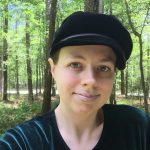 Kassi Dephinia is a writer, visual artist, musician, performer, and activist living invisibly homeless and disabled. She’s using blogs and videos to document her experiences with poverty and disability, to raise awareness of issues even as she struggles with them. She has once more received a scholarship from Alternate ROOTS to attend ROOTS Week 2016 and is thrilled to be able to participate and feed her soul. www.kassidephinia.com
Kassi Dephinia is a writer, visual artist, musician, performer, and activist living invisibly homeless and disabled. She’s using blogs and videos to document her experiences with poverty and disability, to raise awareness of issues even as she struggles with them. She has once more received a scholarship from Alternate ROOTS to attend ROOTS Week 2016 and is thrilled to be able to participate and feed her soul. www.kassidephinia.com

